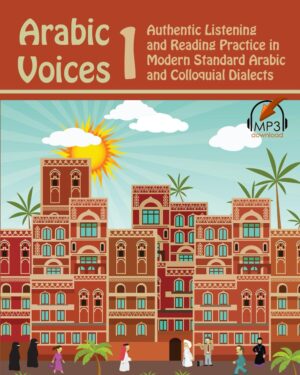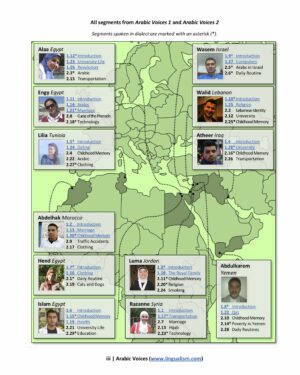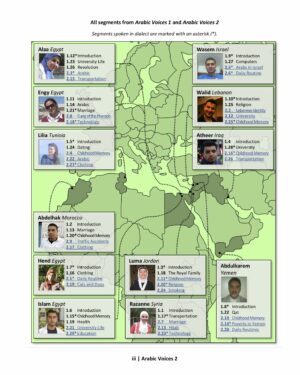☀️SUMMER SALE! 😎SAVE 10% for a limited time. Use coupon code LING10 at checkout. Sale ends July 31. (Offer excludes sale items, bundles, and store credit.)
Home » Modern Standard Arabic » The Lebanese Identity-Walid
The Lebanese Identity-Walid
| Peace, mercy, and blessings of God! [00:00.3] | السلام عليكم ورحمة الله وبركاته! | |
| Hello and welcome to the second part of Arabic Voices videos, your path to learning Arabic. [00:03.1] | أهلًا ومرحبًا بكم في الجزء الثاني من فيديوهات Arabic Voices طريقك لتعلم العربية. | |
| This is Mustafa Ahmed. [00:10.9] | معكم مصطفى أحمد. | |
| Today we will start with the first video of part [book] 2, where we will comment on what Walid said about the Lebanese identity, and we will explain some of the different terms he used in his talk. [00:12.8] | واليوم سنبدأ بأولى فيديوهات الجزء الثاني، حيث سنقوم بالتعليق عمّا قاله وليد بشأن الهوية اللبنانية، وسنشرح بعض المصطلحات المختلفة التي قد استخدمها أثناء حديثه. | |
| So let's start on page 8. Walid says specifically on line 5, "Lebanon has become the focus of the attention of many ancient peoples and civilizations that invaded and lived in it through the ages." [00:30.7] | فهيّا بنا نبدأ في الصفحة الثامنة—يقول وليد وتحديدًا في السطر الخامس: (أصبح لبنان محط أنظار العديد من الشعوب والحضارات القديمة التي قامت بغزوه والعيش فيه على مر العقود). | |
| Where Walid says here that Lebanon is the focus of the attention of many people, and this phrase محط أنظار (the focus of attention) means that many people are interested in this place. [00:49.4] | حيث يقول وليد هنا أن لبنان محط أنظار العديد من الشعوب، وهذه العبارة [محط أنظار] تعني أن كثير من الناس يهتمون بهذا المكان. | |
| When you say that a place is the focus of attention, that is, many people are interested in that place, and they follow the news of this place. [01:02.5] | عندما تقول أن مكانًا ما هومحط أنظار، أي أن كثير من الناس يهتمون بهذا المكان، ويتابعون أخبار هذا المكان. | |
| For example, you can say, "Egypt is the focus of the world's attention," meaning that people around the world care about the issue of Egypt. [01:12.8] | يمكنك أن تقول مثلًا: (إن مصر هي محط أنظار العالم)، أي أن الناس حول العالم يهتمون بالشأن المصري. | |
| In the same line, Walid says, "The one who invaded it and lived in it over the decades," and here Walid uses another phrase that we use a lot in the Arabic language, [01:23.0] | في نفس السطر يقول وليد: (التي قامت بغزوه والعيش فيه على مر العقود)، وهنا يستخدم وليد عبارة أخرى نستخدمها كثيرًا في اللغة العربية، | |
| which is على مر العقود (throughout the ages) or over على مر القرون (over the centuries) or على مر الزمان. You can use any of these phrases to mean that something has gone on for a long time. [01:38.0] | وهي [على مر العقود] أو [على مر القرون] أو [على مر الزمان]، يمكنك استخدام أيًا من هذه العبارات، لتعني أن أمرًا قد استمر لزمنٍ بعيد، لزمن طويل. | |
| You can say, "Egypt has been the focus of the world’s attention over the decades" or "Lebanon has been the focus of people’s attention over the decades, over the centuries, over time," meaning that this has happened for a long time. [01:55.0] | يمكنك أن تقول: (إن مصر كانت محط أنظار العالم على مر العقود) أو (لبنان كانت محط أنظار ال… الناس على مر العقود على مر القرون على مر الزمان)، بمعنى أن هذا قد حدث لزمن بعيد. | |
| And when you use 'ages,' you know that the word means ten of years, or that 'centuries' means hundreds of years, or 'ages' is a general word that you can use whether it is a very long time or just a long time. [02:16.6] | وعند استخدام العقود أنت تعرف أن كلمة عقد تعني عشر أعوام، القرون تعني مئة عام، أو الزمان هي كلمة عامة يمكنك أن تستخدمها سواء كان الزمن طويل جدًا أم فقط زمنٍ طويل. | |
| You could say لى مر العقود or على مر القرون or على مر الزمان. [02:35.2] | يمكنك أن تقول [على مر العقود، على مر القرون، على مر الزمان]. | |
| We then move on to line 6... where Walid says, "such as the Phoenician, Byzantine, Roman, and Ottoman civilizations, and others." [02:42.0] | ننتقل بعد ذلك إلى السطر السادس حي… حيث يقول وليد: (كالحضارة الفينيقية والبيزنطية والرومانية والعثـ… والعثمانية وغيرها). | |
| Walid uses here at the end of the sentence the word وغيرها (and others) to mean 'et cetera,' meaning that there are other civilizations, but he will not list all these civilizations, [02:55.9] | يستخدم وليد هنا في نهاية الجملة كلمة [وغيرها] ليعني [إلى آخره]، أي أن هناك حضارات أخرى، ولكنه لن يقوم بسرد كل هذه الحضارات، | |
| but suffice with what he mentioned, and he says وغيرها, which means referring to other civilizations, which means إلى آخره. [03:06.8] | ولكن يكتفي بما ذكره، ويقول [وغيرها] يعني الإشارة إلى غيرها من الحضارات، وهي تعني [إلى آخره]. | |
| You can say, for example, "I read literary, scientific, cultural books, etc.). That is, there are other kinds of books I have read, but I will not list everything. [03:17.0] | يمكنك أن تقول مثلًا: (قرأت الكتب الأدبية والعلمية والثقافية وغيرها)، [وغيرها] أي هناك أنواع أخرى من الكتب قد قرأتها، ولكن لن أقوم بسرد كل شيء. | |
| In the same context, you can use the word إلى آخره instead of غيرها to mean the same thing. "I read literary, scientific, cultural books, etc." [03:30.4] | وفي نفس السياق يمكنك أن تستخدم كلمة [إلى آخره]، بدلًا من [غيرها] لتعني نفس الشيء، (قرأت الكتب الأدبية والعلمية والثقافية إلى آخره). | |
| We then move to line 7, where Walid says, "This is why Lebanon has become rich in the diversity of its civilizations and languages," and Walid here uses the word or adjective غني (rich). [03:44.1] | ننتقل بعد ذلك إلى السطر السابع، حيث يقول وليد: (لهذا السبب أصبح لبنان غنيًا بتنوع حضاراته ولغاته)، ويستخدم وليد هنا كلمة أو صفة [غني]. | |
| And when we use the word غني (rich) we often use—especially if we want to describe a country or a person—we say 'rich in something.' "Lebanon is rich in the diversity of its civilization." And we use the preposition بـ after this adjective. "This place is rich in its wealth," and so on. [03:58.5] | وعندما تستخدم كلمة [غني] غالبًا ما نستخدم—خاصةً إذا أردنا أن نصف بلدًا ما أو شخصًا ما—نقول [غنيًا بشيءٍ ما]، (فلبنان غني بتنوع حضارته)، ونستخدم حرف [ الباء] بعد هذه الصفة هو… (هذا المكان غني بثرواته)، وهكذا. | |
| And when we use the word غني here, we then use the preposition بـ, and as you saw here, "Lebanon is rich in the diversity of its civilizations." [04:25.1] | وعندما نستخدم كلمة [غني] هنا نحن نستخدم بعدها حرف [ الباء]، وكما رأيت هنا (لبنان غنيًا بتنوع حضاراته). | |
| In the same context, or in the same way on line 9, Walid uses فعُرف بـ (so, it was known as," and this is also بـ… means in a close sense, if something is known somewhere. [04:38.2] | في نفس السياق، أو بنفس الطريقة في السطر التاسع يستخدم وليد [فعُرف بـ]، وهذه أيضًا ب… يعني بمعنى قريب، إذا عُرف مكان ما بشيءٍ ما، | |
| That is, this place is 'famous for.' You say, "This place is famous for or is known for," that is, it is known for something. "This country is famous for its wealth. This country is known for its history..." [04:55.4] | أي أن هذا المكان مشهورٍ بـ تقول (هذا المكان مشهورٍ بـ أو معروف بـ)، أي أنه معروف بأمرٍ ما، (هذا البلد مشهور بثرواته، هذا البلد معروف بثرواته، هذا البلد معروف بتاريخه، هذا البلد مشهور بتاريخه). | |
| We then move to line 14, where Walid says, "according to the date and location, the second theory is not true," and Walid here uses the word بحسب (according to) that is, طبقًا لـ. [05:15.9] | ننتقل بعد ذلك إلى السطر الرابع عشر، حيث يقول وليد: (بحسب التاريخ والموقع فالنظرية الثانية ليست بحقيقة)، ويستخدم وليد هنا كلمة [بحسب] أي [طبقًا لـ]، | |
| According to the date and location, the second theory is not true." You can use بحسب or طبقًا لـ both of which are correct. [05:32.6] | (فطبقًا للتاريخ والموقع فالنظرية الثانية ليست بحقيقة، بحسب التاريخ والموقع فالنظرية الثانية ليست بحقيقة) فيمكنك أن تستخدم [بحسب] أو [طبقًا لـ] كلاهما صحيح. | |
| For example, you can say, "according to the statistics the company will make a lot of profits." بحسب or طبقًا لـ. Both are correct. [05:48.7] | يمكنك أن تقول مثلًا: (بحسب الإحصائيات الشركة ستقوم بتحصيل أرباح كثيرة، طبقًا للإحصائيات الشركة ستقوم بتحصيل أرباح كثيرة)، [طبقًا لـ] أو [بحسب] كلاهما صحيح. | |
| We then move to line 18, where Walid says, "From this point of view, we can say and be certain that the Lebanese is an Arab." [06:08.7] | ننتقل بعد ذلك إلى السطر الثامن عشر، حيث يقول وليد: (من هذا المنطلق يمكننا القول والجزم أن اللبناني هو عربي). | |
| If you say, "I can be certain of something," that is, you are absolutely certain that you know this thing very well, you are very certain, then you can say, "I can be certain that this will happen or that this… that this is true." [06:20.9] | إن قلت يمكنني الجزم بشيء، أي أنك متأكد تمام التأكد أنت تعرف هذا الشيء جدًا، أنت متأكد جدًا، فيمكنك أن تقول: (يمكنني الجزم بأن هذا سيحدث أو أن بهذا… أن هذا أمر حقيقي). | |
| For example, you can say, "I can be certain that the relations between the two countries will be strengthened," if you can be certain of something, you are absolutely sure of it. [06:40.8] | يمكنك أن تقول مثلًا: (يمكنني الجزم بأن العلاقات بين البلدين ستقوى)، فإذا أمكنك الجزم من شيء معين، أنت متأكد منه تمام التأكد. | |
| Great! We then move on to line 20 and the last, where Walid says, "which made it its home, and enriched it with several qualities that distinguished it from the rest of the peoples of the world," and here we would like to comment on the use of the preposition فـ in this sentence. [06:56.5] | عظيم! ننتقل بعد ذلك إلى السطر العشرون وآخر سطر بالحديث، حيث يقول وليد: (التي اتخذته موطنًا لها، فأغنته بصفاتٍ عدةٍ ميّزته عن سائر شعوب العالم)، ونودّ هنا التعليق على استخدام حرف [ الفاء] في هذه الجملة. | |
| And the preposition فـ in the Arabic language has many uses, and we will talk about some of them at another time, and today we want to refer to only one of these uses, which is what is known as the "فـ of causation." [07:21.7] | وحرف [ الفاء] في اللغة العربية له استخدامات كثيرة، سنتتحدّث عن بعضها في وقتٍ آخر، واليوم نريد الإشارة إلى استخدامٍ واحد فقط من هذه الاستخدامات وهو ما يعرف ب [فاء السببية]. | |
| Here فـ indicates that one thing caused something else to happen. "The one who made it its home." This is the reason. What did this reason do? "It enriched him with several qualities." [07:37.2] | وهنا [الفاء] تُشير إلى أن شيئًا ما كان سببًا في حدوث أمرٍ آخر؛ (فالتي اتخذته موطنًا لها) هذا هو السبب، ماذا فعل هذا السبب (فأغنته بصفاتٍ عدة)؛ | |
| That is, the richness occurred because Lebanon was taken as its home, so the فـ here is known as the فـ of causation, meaning that one thing happened because of another. [07:54.4] | أي أن الغنى حدث بسبب اتخاذ لبنان كموطن لها فالفاء هنا تُعرف [بفاء السببية]، أي أن أمرًا ما حدث بسبب أمرٍ آخر. | |
| You can say, for example, "I studied and passed." Success happened because of studying; "I watched the video and understood the rule," meaning that the understanding occurred because of watching the video, which is called the causation. [08:09.6] | يمكنك أن تقول مثلًا: (أنا ذاكرت فنجحت)، فالنجاح حدث بسبب المذاكرة؛ (أنا شاهدت الفيديو ففهمت القاعدة)، أي أن الفهم حدث بسبب مشاهدة الفيديو، وهو ما يطلق عليه [بفاء السببية]. | |
| I hope you have benefited from this video. [08:29.8] | أتمنى أن تكونوا قد استفدتم من هذا الفيديو. | |
| Thank you very much. May the peace, mercy and blessings of God be upon you. [08:32.7] | أشكركم شكرًا جزيلًا، والسلام عليكم ورحمة الله وبركاته. |
Video Lessons
Arabic Voices MSA Lessons
Arabic teacher Mostafa Ahmed takes us through segments in MSA from Lingualism's book Arabic Voices 1: Authentic Listening and Reading Practice in Modern Standard Arabic and Colloquial Dialects, explaining interesting points of grammar and vocabulary.

Palestinian Arabic Verb Conjugation Drills: Anki Flashcards (Set 3)

Egyptian Arabic Verb Conjugation Drills: Anki Flashcards (Set 4)
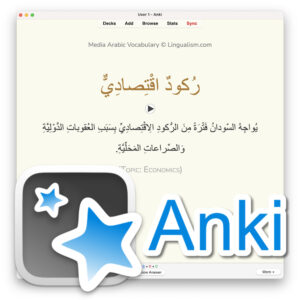
Media Arabic Vocabulary 2: Anki Flashcards

Egyptian Arabic Verb Conjugation Drills: Anki Flashcards (Set 1)
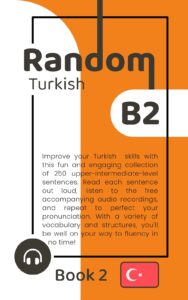
Random Turkish B2 (Book 2)

Kalaam Kull Yoom 1: Anki Flashcards
© 2024 Lingualism LLC

